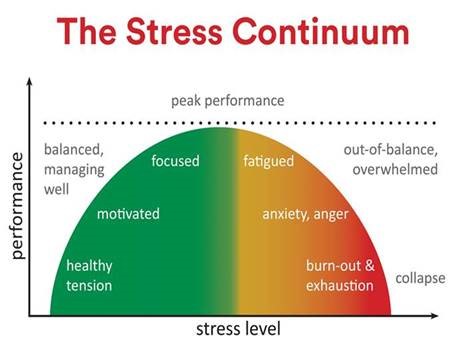Stress Management Strategies
What is stress?
Stress is an automatic response to demands, pressures, and competing priorities. It's also a normal part of life. Not all stress is bad. Some stress can motivate people, helping them achieve goals. But too much stress, or stress carried too long, can activate a person’s “fight or flight” response. If left unchecked, this can decrease the ability to function. People’s responses to stress vary.
The Stress Continuum explained
- A low to moderate level of stress can be productive. Students in the “green zone” experience low to moderate levels of stress as motivating and can help them focus on what they have to get done. To stay in this green, healthy tension zone, individuals can manage their stress with activities that replenish the physical, mental, and emotional energy lost to stress.
- Peak performance is when someone is at their very best. This means feeling energized, grounded, and focused on the important tasks at hand like taking an exam, giving a presentation, or having an important conversation with someone. Peak performance is time limited, and can be achieved when you have a manageable amount of stress that acts as a motivator. Once the task is completed, it is important to take a break and do something less intense or something that helps to replenish your energy and reduce the level of stress bringing you back into the green, healthy tension zone.
- The yellow zone of the stress continuum represents the point of diminishing returns. This is when someone has been carrying stress for too long, or attempting to stay at peak performance and continuing pushing forward without taking purposeful, restorative breaks. A person in this yellow zone may think they are working efficiently but actually their performance level is declining and they feel fatigued, out of balance, or they may even start to feel overwhelmed by what they need to get done.
- Too much stress, or stress carried for too long, can push someone into the orange or red zone. This end of the stress continuum is where someone is experiencing anxiety, exhaustion, and burnout because their level of stress is too high.
Causes of distress
In general, distress occurs when the amount of stress exceeds the resources (both internal and external) one has to handle it. Most distress comes from the actual or perceived loss of important mental health elements (e.g., connection, status, health, meaning, control, identity). A person’s level of internal and external resources for coping varies widely based on personality, mindset, level of privilege and oppression, and cultural factors. For one student, a failing paper grade may be brushed off, while for another, a failing paper grade may be experienced as threatening their sense of self-worth, compromising access to financial aid, or bringing shame/embarrassment on their family. How distress appears on the surface can vary greatly between people. You may notice one or more signs and decide that something is clearly wrong. Or you may just have a “gut feeling” that something’s amiss. Either way, you should take these signs – and your intuition – seriously.
Stress management tips
- Take care of yourself: Prioritize sleep. Eat nutritious foods each day. Get some regular exercise. Create a routine of regular self-care practices that work for you.
- Connect with others: Having a strong social support network made up of friends and family members helps to buffer against stress. Here are some tips for staying connected.
- Improve your time management skills: Feeling overwhelmed? Managing your time more efficiently can help to reduce these feelings and increase your productivity.
- For undergraduate students: Cornell’s Learning Strategies Center is an excellent resource for learning to be more organized and efficient with the time you have.
- Let go of perfectionism: No one hits it out of the ballpark every time. We’re all human. Try to be understanding with yourself as you would be with a friend or colleague.
- Be mindful of social media: Social media can help us keep in touch with people near and far, but it can also cause frustration, procrastination, and it’s easy to lose track of time while using social media. Consider limiting your time spent on social media.
- Keep things in perspective: Ask yourself - what’s the worst thing that could happen? And what is the likelihood of that happening? Remember, no matter how bad (or good) things are right now, the only constant is change.
- Reframe negative thoughts: Learn to talk back to and stop negative self-talk, and give yourself some credit for your abilities and accomplishments. Learn from mistakes and view them as opportunities for growth.
- Get out in nature: Research shows that spending even short periods of time in nature can improve memory, ability to concentrate, and reduce overall stress and improve your sense of well-being. Explore the Cornell Botanic Gardens or find a new spot using the NatureRX resources.
